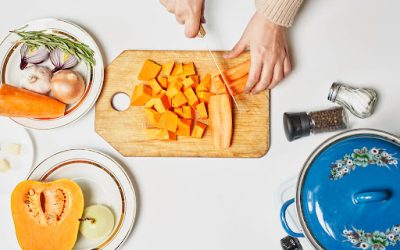What we eat plays a critical role in how we feel, both physically and mentally. Embracing a diet rich in real, nutrient-dense foods not only fuels our bodies but also nurtures our minds, leaving us feeling vibrant and energized.
A Mood-Boosting Menu
Nutrient deficiencies are common, and can cause a variety of unfortunate symptoms. Common deficiencies, like Vitamin D, B-12, and magnesium, have been linked to migraines, headaches, increased pain, and higher inflammatory markers. Basically, not feeling great. While there is no single “super food” that will cure all, luckily, a menu with variety might do the trick. There seems to be a broad consensus that a menu with whole foods, including lots of plants (vegetables, beans, legumes, nuts, seeds, whole grains, and fruit), lean protein, and healthy fats (think of olive oil, olives, fatty fish, nuts, seeds, avocado) offers your body the best fuel for overall wellness.
Conversely, a diet rich in highly processed foods (foods with a long list of ingredients that aren’t in your pantry) tend to be associated with higher inflammatory markers. Highly processed foods are low in vitamins and minerals, yet high in calories and sugar. Decreasing highly processed foods, and replacing them with whole foods, lowers those inflammatory markers, and can help to keep blood sugar more stable. When blood sugar is stable, energy and mood tend to follow. Additionally, by replacing those low-nutrient foods with more nutritious whole foods, you offer your body more vitamins, minerals, and essential nutrients for healthy hormone production and better brain function.
Gut Health and Happiness
The gut-brain connection is a newer area of research that explores the influence of our digestive system on mental health. Incredibly, about 95% of serotonin, which helps to regulate sleep, appetite, moods, and inhibit pain, is produced in the digestive tract. Aiming for a healthy and diverse diet with many plants (vegetables, beans, legumes, nuts, seeds, whole grains, and fruit), along with fermented foods, helps to promote a healthy gut.
Lean Into Healthier Eating
Consider the mantra “progress… not perfection”. It isn’t realistic to aim for perfection when it comes to nutrition. There will always be a birthday party or pizza night on the horizon. Rather, consider one way you might be able to slightly improve your day to day nutrition habits to get more of the real, wholesome foods mentioned above. Is there an opportunity to replace a highly processed food with a whole, real food a few times per week?
For example, swap out an afternoon snack of chips or a granola bar and replace it with a handful of nuts paired with a piece of fruit. If you find your dinner meal is lacking in color or variety, stock up on frozen veggie blends that steam in the microwave for an easy, highly nutritious side dish for any meal (even on pizza night!). Small changes like this matter, and do add up to bigger differences in your physical, mental, and gut health over time.




